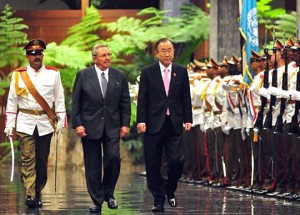UNITED NATIONS — If it’s Tuesday, this must be Havana. Given UN Secretary General Ban Ki-Moon’s peripatetic global travels, the two-day visit to Cuba, especially in the midst of a frigid New York Winter, seemingly made sense. After all, the trip was officially to attend the meeting of the Community of Latin American and Caribbean States (CELAC) Summit in Havana.
To be sure UN Secretary Generals, theoretically above the political fray but still very much part of the political discourse, can visit any of the UN’s 193 member states, without raising many eyebrows. And given Ban Ki-Moon’s frequent flier status jetting from Conferences to global goings on, it really is no big deal in venturing to nearby Cuba.

But let’s not forget, communist Cuba remains a political lightning rod for American politics since the 1960’s, given the island’s horrible civil and human rights record. Thus, even a seemingly superficial visit by the UN Secretary General can be viewed as a subtle political “benediction” to the Castro brothers’ regime.
Ban Ki-Moon toured Old Havana whose architectural splendor has been frozen in time not so much by intent than neglect, then made all the usual meet and greet stops for a visiting foreign dignitary, and then addressed the CELAC Summit. CELAC represents an attempt by Venezuela and others to have a more “progressive” political counterweight to the mainstream Organization of American States (OAS).
The Secretary General met with government officials, as well as former dictator Fidel Castro, as well as the current Cuban leader Raul Castro.
Importantly on the eve of his visit to Cuba, an open letter for European and Latin American parliamentarians and human rights activists expressed “concerns about the human rights situation in Cuba in general: the increasing number of human rights defenders arbitrary arrests, suspicious deaths and beatings on the streets of Cuban citizens, and other repressive measures taken by the Cuban government.” The signers were, “Extremely concerned that the Secretary General’s visit to Cuba may be seen as legitimizing a government that systematically violates human rights”.
Given that the UN and organizations are dedicated to the promotion of global civil and human rights, there’s less than a hint of irony in the Secretary General’s agenda.
Nonetheless, in a series of private meetings with government officials, Ban was said by insiders to have consistently and vigorously spoken about the pressing Cuban human rights situation.
Following the trip, when asked about the Secretary General’s statements in Havana, the UN Spokesman Martin Nesirky asserted, “I can certainly attest that he brought up the question of human rights repeatedly and in strong terms, including references to recent developments.”
Yet given the sensitive nature of the discussions, he added, “But, I would refrain from going into further details about that because that could be counter-productive.” That’s totally understandable. Indeed quiet behind the scenes diplomacy can often achieve much more long term effects than tub-thumping pronouncements.
Back in the 1980’s a former UN Secretary General Perez de Cuellar, himself a Latin American, visited Castro’s Cuba and sadly fell short of stressing the human rights issues which acutely plagued Cuba.
But there’s more. Seemingly unrelated to the trip, back at the UN headquarters in wintery New York, a series of dreary and pro-forma meetings on non-governmental organizations (NGO’s) turned nasty when the Cuban delegation working in a political tag-team with Mainland China, postponed accreditation of more that fifty NGO groups.
Groups like the International Coalition of Historic Site Museums of Conscience, the Jewish Renaissance Foundation (both from the USA) and United Hatzalah of (Israel) were blocked by Cuba on technical grounds. While deliberations like this often go under the political radar, it’s clear that the government in Havana is willing to use less than subtle methods to deal with any whiff of potential criticism from afar.
Cuban police have arrested a leading democracy activist Jorge Luis Garcia Perez Antunez just prior to his scheduled address to the upcoming Geneva Summit for Human Rights. His testimony is scheduled for Feb. 25.
Given the nature of the venue, UN Secretary General Ban, in the spirit of his recent meetings in Cuba, should call upon the authorities in Havana to release Antunez and permit him to attend the Human Rights Summit. Such a move would reinforce Ban’s standing as a human rights champion.
John J. Metzler is a U.N. correspondent covering diplomatic and defense issues. He writes weekly for WorldTribune.com. He is the author of Transatlantic Divide ; USA/Euroland Rift (University Press, 2010).


You must be logged in to post a comment Login